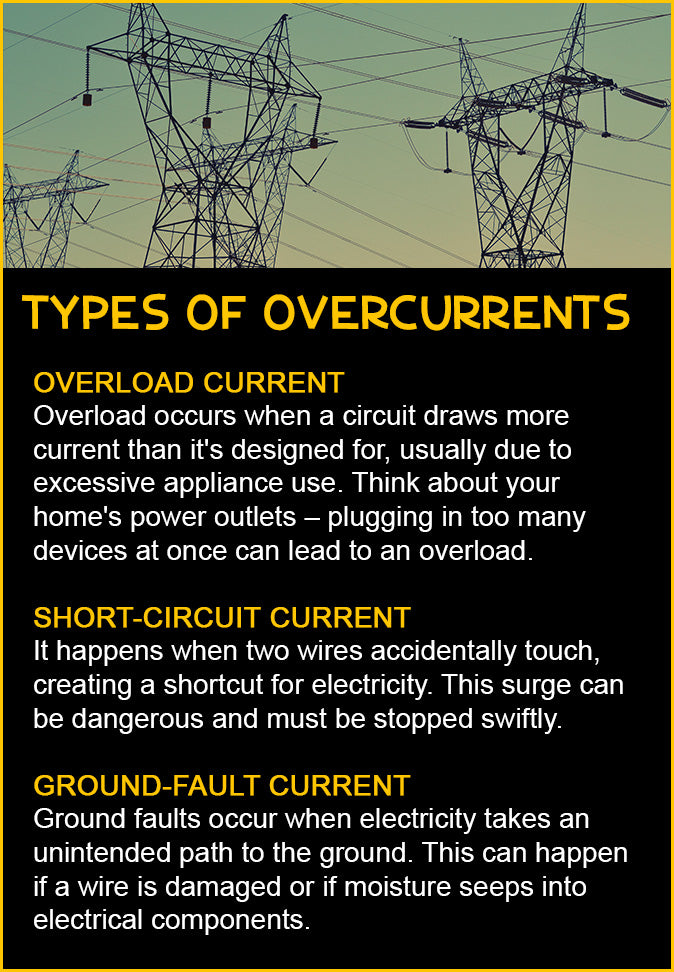
Introduction
Explanation of Overcurrent, Overload, and Overvoltage terms
Overcurrent occurs when excessive current flows in a circuit due to overload or short circuit conditions. For instance, a magnetic trip rated for 200% connected to a 100A load circuit will trip at 125A. It is crucial to differentiate overload from short circuit, and overvoltage from high voltage, as each has distinct characteristics. Understanding these differences is essential for those new to the field.

Overcurrent
Definition and causes of overcurrent
Overcurrent occurs when there is an excessive flow of current in a circuit, often resulting from overload or short circuit situations. For example, a magnetic trip rated for 200% on a 100A load circuit will trip at 125A. Differentiating overload from short circuit and overvoltage from high voltage is crucial, as each type has unique characteristics.
Protection mechanisms against overcurrent
There are several protection mechanisms in place to safeguard against overcurrent situations, such as fuses, circuit breakers, and overcurrent relays. These devices are designed to detect abnormal current levels and interrupt the flow to prevent damage to the circuit or equipment. Understanding and implementing these protection measures is vital in maintaining the safety and efficiency of electrical systems.

Overcurrent
Definition and causes of overcurrent
Overcurrent occurs when there is excessive current flow in a circuit, often due to overloads or short circuits. For instance, a magnetic trip rated for 200% on a 100A load circuit will trip at 125A. Differentiating overload from short circuits and overvoltage from high voltage is crucial, as each type has unique characteristics.
Protection mechanisms against overcurrent
Protection mechanisms like fuses, circuit breakers, and overcurrent relays safeguard against overcurrent situations. These devices detect abnormal current levels and interrupt the flow to prevent circuit or equipment damage. Understanding and implementing these safeguards is vital for electrical system safety and efficiency.
Overload
Understanding overload in electrical circuits
Differentiating between overcurrent and overload

Overcurrent
Definition and causes of overcurrent
Overcurrent occurs when there is excessive current flow in a circuit, often due to overloads or short circuits. For instance, a magnetic trip rated for 200% on a 100A load circuit will trip at 125A. Differentiating overload from short circuits and overvoltage from high voltage is crucial, as each type has unique characteristics.
Protection mechanisms against overcurrent
Protection mechanisms like fuses, circuit breakers, and overcurrent relays safeguard against overcurrent situations. These devices detect abnormal current levels and interrupt the flow to prevent circuit or equipment damage. Understanding and implementing these safeguards is vital for electrical system safety and efficiency.
Overload
Understanding overload in electrical circuits
Differentiating between overcurrent and overload
.
Overvoltage
Causes and effects of overvoltage
Protective measures against overvoltage

Comparison
Distinguishing characteristics of Overcurrent, Overload, and Overvoltage
Overcurrent
Definition and causes of overcurrent
Overcurrent occurs when there is excessive current flow in a circuit, often due to overloads or short circuits. For instance, a magnetic trip rated for 200% on a 100A load circuit will trip at 125A. Differentiating overload from short circuits and overvoltage from high voltage is crucial, as each type has unique characteristics.
Protection mechanisms against overcurrent
Protection mechanisms like fuses, circuit breakers, and overcurrent relays safeguard against overcurrent situations. These devices detect abnormal current levels and interrupt the flow to prevent circuit or equipment damage. Understanding and implementing these safeguards is vital for electrical system safety and efficiency.
Overload
Understanding overload in electrical circuits
Differentiating between overcurrent and overload
Overvoltage
Causes and effects of overvoltage
Protective measures against overvoltage

Real-life Examples
Scenarios demonstrating overcurrent, overload, and overvoltage
In real-life scenarios, overcurrent can lead to circuit overheating from excessive current flow, necessitating protection mechanisms like fuses and circuit breakers. Overload occurs when current surpasses safe levels, while overvoltage can damage electronic devices through excessive voltage. Safeguards like thermal magnetic circuit breakers and voltage regulators are crucial in preventing damage from these electrical issues.

Importance in Electrical Systems
Significance of managing Overcurrent, Overload, and Overvoltage
In real-life scenarios, overcurrent can lead to circuit overheating from excessive current flow, necessitating protection mechanisms like fuses and circuit breakers. Overload occurs when current surpasses safe levels, while overvoltage can damage electronic devices through excessive voltage. Safeguards like thermal magnetic circuit breakers and voltage regulators are crucial in preventing damage from these electrical issues.
